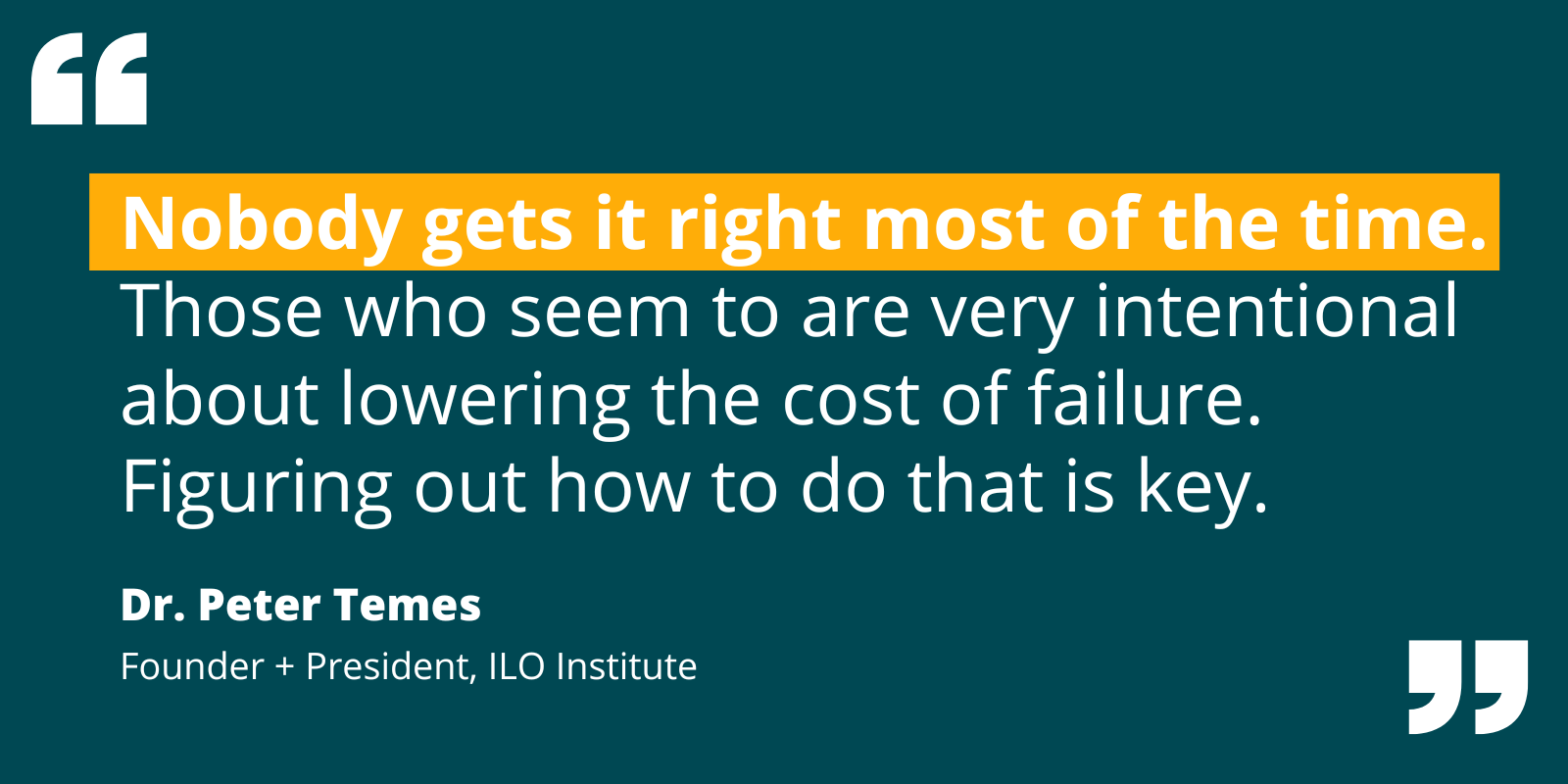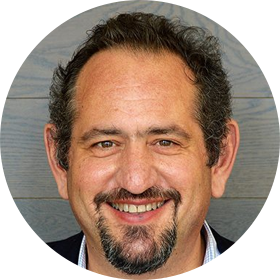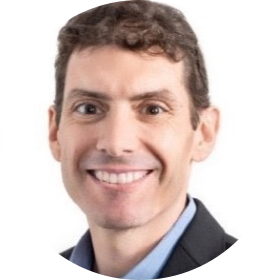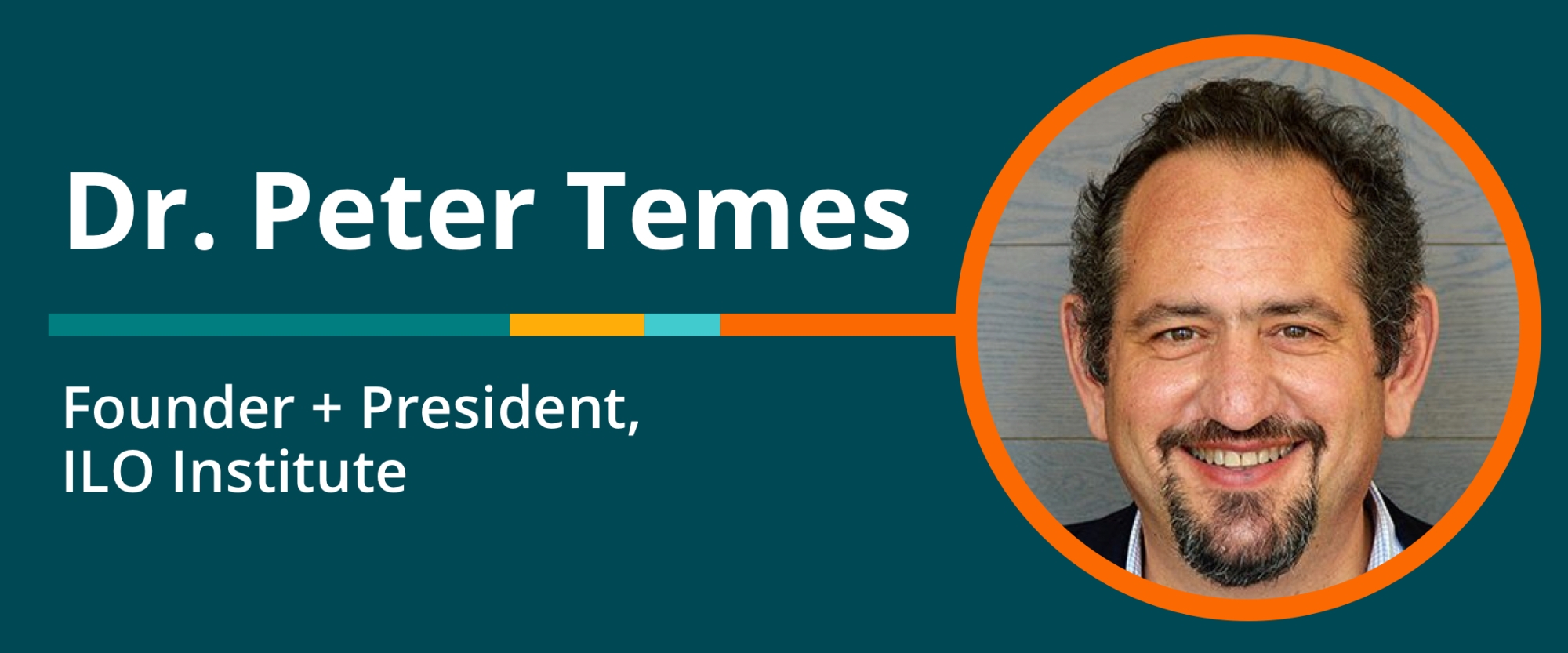Despite our focus on higher education, the University Innovation Alliance (UIA) always watches innovators working in other sectors. For this podcast in the Innovation Spotlight Series, we spoke with Peter Temes, president of the Institute for Innovation in Large Organizations (ILO Institute). He discussed how his institute works, the relative cost of failure, how organizations need both efficiency and discovery, why higher ed demands two-way communication, and leaders who foster innovation.
Innovation as a Matching Function
Dr. Temes began by explaining the ILO Institute's mission:
"We're a community of about 50 members who mirror the North American economy: big hotel chains, technology companies, significant universities, health systems. We get together about 40 times a year in different cities, mixing up current members with interesting people helping to lead innovation in large organizations, saying, 'Here are the challenges we're dealing with. Here's what's working. Here's what's not working. Here are some lessons we've learned.' You get tremendous cross-fertilization. One of the things we weren't talking about ten years ago that we talk about today is innovation as a matching function. There are valuable emerging solutions to emerging challenges happening all over the place. Matching those is where you have tremendous value."
As an example of matching, Dr. Temes described how the pharmaceutical company Eli Lilly introduced its model for inviting outside thinkers to help solve pure science problems, and how NASA then used that model to invite fresh thinking about aerospace design. He added:
"The role that we played was through the conversation -- which is part of what higher education is all about. We're all learners, we're all teachers in this beautiful space where learning comes first. We try to do that in a very focused way, to match emerging opportunities and emerging resources, to create more platforms and more engines for more of that matching."
Lowering the Cost of Failure
Dr. Temes suggested what higher ed might learn about innovation from other sectors:
"The biggest lesson is still the fundamental that hasn't changed since we started doing this work 18 years ago: lowering the cost of failure. The big organizations that are better at making new things work almost never succeed in a single iteration. So maybe I'm a student, cafeteria worker, professor, or dean. I've got the light bulb; here's an idea. How do I test it? If I test slowly and invest a lot in the testing, it has a high cost of failure. If I can say, 'We have lots of tools for testing. Let's test fast and look for an early signal that has low cost in terms of money, time, impact on current relationships and reputation, and impact on the people inside the organization' -- if you keep those costs low, you'll see lots of experimenting without harm when those experiments fail.
"With positives, you'll see what looks like a much higher batting average, because the world doesn't see most of those mini experiments. The world sees the first things that come to market and says, 'These guys seem to get it right most of the time.' Nobody gets it right most of the time. Those who seem to usually are very intentional about lowering the cost of failure. So, figuring out how to do that is key."

Innovation as Discovery
Organizations focused on efficiency are different from those focused on discovery. While both functions are important, Dr. Temes noted that they don't overlap easily:
"It is not a bad thing, even in an innovative university, corporation, or hospital, to say, 'People are just focused on efficiency.' We want really good efficiency, but we also want the right amount of discovery-oriented work. Folks who work in that space look terrible from efficiency standards. They're not narrowly focused, they're not repeating success, and they're asking questions that we don't know the answers to -- the most important questions we should be asking.
"The biggest killer of innovation initiatives is when the university president or CEO or business unit leader charters a person or a group and says, 'You are my discovery group. You're the human on my team who's leading this bunch of folks who are going to help us learn how to operate on the frontier.' And then a week into building this new organization inside the bigger organization, the CFO or the head of HR picks up the phone and says, 'Here are the rules. Here's what you're responsible for. Here's how many units you have to move this week.' The discovery leader cannot be asked how you spent every nickel every week, or evaluate their team with the same checklist that the efficiency-oriented organization is always leaning on. That drives people out, it's really counterproductive, and it just pulls apart the way that this kind of mini, discovery-oriented organization needs to work."
Innovation as Communication
Dr. Temes explained why he thinks the higher ed sector seems to lag in innovation:
"You have a cranky old professor like me in front of a group of younger students, and he says, 'There's no online module for this course. It's not so different from Plato sitting at one end of a log and you all sitting at the other end. That's how I like to teach.' But in this communications-saturated world, even you, Professor Cranky, have so many flows of information, and if you are the kind of old-school professor who most of us remember with fondness, you're someone who loves learning. There's so much digital technology making so much learning available, you're swimming in it, and you are bringing it to folks even if you're just sitting on a log talking. The maturity of these technologies is what's really changed the game. How we deploy that is still up in the air."
He shared a personal memory from Brooklyn College in the '80s:
"In every corner of the room was a large vacuum tube television hung by a big metal support arm. None of them were connected. This was part of the new wave of technology that would revolutionize higher education video-based learning. This was an investment in the hardware before we understood what the learning function was. The folks sitting in that room potentially watching had not been asked or given the positive experimental status to say, 'Well, here's how I would use this tool if I could flip around the TV.' Those TVs were not built to be flipped around. They were built to be one-way communications devices.
"Unfortunately, a lot of higher ed traditionally has been about that one-way communication, especially with undergraduates. Now we're in this multi-directional communications world, which is a beautiful thing. Nobody knows the right way to do this next week or next month. Virtually all of the learning we do has to have those elements of discovery."
Innovating as an Organization
We like to end Innovation Spotlight interviews by asking our guest for an example of an innovative individual or organization that could teach higher ed something important. Here's what Dr. Temes offered:
"Microsoft has been a fascinating transformation story under Satya Nadella. Satya was running a significant part of the business before he was elevated in a moment when Microsoft was making a lot of money and had monopoly strength in different areas, which is true of some universities. Even if it didn't do a lot of new things, it would've had good year after good year leading toward a downslope. The first thing he did was engage a lot of his senior leadership and also junior folks to tell the new boss how they saw the world and what their goals were beyond doing a good job this week, month, or quarter. It took him several months to say, 'We need a new vision, and what I'm hearing and what I'm affirming is our future will be 100% mobile and 100% digital.' It was the kind of vision that was subject to change and adjustment to the realities that were emerging to discovery. That clarity was enormously helpful.
"It then took him two years to change all the sales incentives to align with it, because he didn't want people to feel like the social contract of how they work had been changed without their engagement. There were no surprises. He was able to execute that well because he changed the sales incentives. People with a lot of talent and who cared about making more money started doing more of what he wanted them to do, and the whole firm aligned. It was also about trust. When a university, corporation, or big not-for-profit says, 'Here's our future, and here's what we believe in,' if you keep managing the same way, which everyone recognizes doesn't get us there, you actually burn trust, and you create the habit of your folks saying, 'Okay, that's what we're saying, but it's always a little different from what's really going on.' Aligning those two is crucial."
Note: This interview in the Innovation Spotlight Series originally aired on March 13, 2023 as part of the University Innovation Alliance’s Innovating Together Podcast, appearing live on Facebook, Twitter, and LinkedIn.
Links Mentioned in This Episode
• University Innovation Alliance
• Innovation Spotlight Series
• Peter Temes
• Institute for Innovation in Large Organizations (ILO Institute)
• Satya Nadella (Chairman and CEO at Microsoft)
Bios of Guest and Co-Hosts

Guest: Peter Temes, Founder & President, Institute for Innovation in Large Organizations
Peter Temes founded the Institute for Innovation in Large Organizations (ILO) in 2005 as a membership organization providing research, community, and knowledge-sharing for upper-level executives leading innovation inside multi-billion-dollar corporations. Member organizations have included IBM, PepsiCo, Marriott, Save the Children, Microsoft, FedEx, NASA, Toyota, and the New York MTA, among about 150 others. Dr. Temes began his career as a full-time member of the Harvard University Faculty of Arts and Sciences, and went on to found Enterprise Interactive, a consulting and research firm. He has led research initiatives for Goldman Sachs, ExxonMobil, Microsoft, Disney, EY, Pfizer, GM’s autonomous vehicles group, and many other companies in the technology, finance, and consumer marketing sectors. He has also served as Dean and Campus Chief Executive for Northeastern University, President of the Antioch New England Graduate School, and President of the Great Books Foundation. Dr. Temes is the author and editor of several books, including Teaching Leadership: Essays in Theory and Practice, The Just War: An American Reflection on the Morality of War in Our Time, and Against School Reform (And in Praise of Great Teaching): Getting Beyond Endless Testing, Regimentation, and Reform in Our Schools. He holds a Ph.D. and three master’s degrees from Columbia University.

Co-Host: Bridget Burns, CEO, University Innovation Alliance
Dr. Bridget Burns is the founder and CEO of the University Innovation Alliance (UIA). For the past decade, she has advised university presidents, system chancellors, and state and federal policy leaders on strategies to expand access to higher education, address costs, and promote completion for students of all backgrounds. The UIA was developed during Bridget’s tenure as an American Council on Education (A.C.E.) Fellowship at Arizona State University. She held multiple roles within the Oregon University System, including serving as Chief of Staff and Senior Policy Advisor, where she won the national award for innovation in higher education government relations. She was a National Associate for the National Center for Public Policy and Higher Education, and has served on several statewide governing boards including ones governing higher education institutions, financial aid policy, and policy areas impacting children and families.

Co-Host: Ian Wilhelm, Assistant Managing Editor, The Chronicle of Higher Education
Ian Wilhelm is a journalist with more than 20 years of experience, covering higher education, nonprofits, and philanthropy. He currently serves as Assistant Managing Editor for Chronicle Intelligence (CI), a division of The Chronicle of Higher Education. CI produces content to inform colleges and universities about national issues and develop ways to solve pressing problems on campuses. Previously at The Chronicle, he was a senior editor, helping manage a team of reporters focused on enterprise and feature stories for its weekly newspaper and daily website. He also served as the international editor and senior writer for The Chronicle of Philanthropy, the newspaper for the nonprofit world. As a freelance writer, Ian's articles have appeared in The Christian Science Monitor, The Religion News Service, USA Today, The Washington Post, Newsday, and other publications. He has worked abroad, living in Germany and reporting stories from Africa, China, Sri Lanka, and elsewhere.
About Innovation Spotlight
Innovation Spotlight is an event series that happens live on Facebook, Twitter, and LinkedIn. It also becomes a podcast episode. We feature short interviews with experts on specific interventions and innovations that serve student success, with a particular emphasis on the critical skills necessary to help an institution eliminate disparity. By elevating these cutting-edge insights, ideas, and innovators in the field, who share what they're learning from the front lines, we aim to help viewers identify the first three steps to take, what they need to know to take action tomorrow, and what experts have learned from implementation that they wished they’d known beforehand. We hope that, by surfacing these perspectives and inspirations, along with some tips and tricks to make the complicated business of innovation a little easier, we can help you in your work.
Rate, Review & Subscribe
Learn why hundreds of people have rated this new podcast 5 stars! Please join others and rate and review this podcast. This helps us reach and inform more people -- like you -- to help increase the number and diversity of college graduates in the United States.
Click here, scroll to the bottom, tap to rate with five stars, and select “Write a Review.” Then be sure to let us know what you loved most about the episode! Also, if you haven’t done so already, subscribe to the podcast. We’ll be adding a bunch of bonus episodes to the feed and, if you’re not subscribed, there’s a good chance you’ll miss out.

